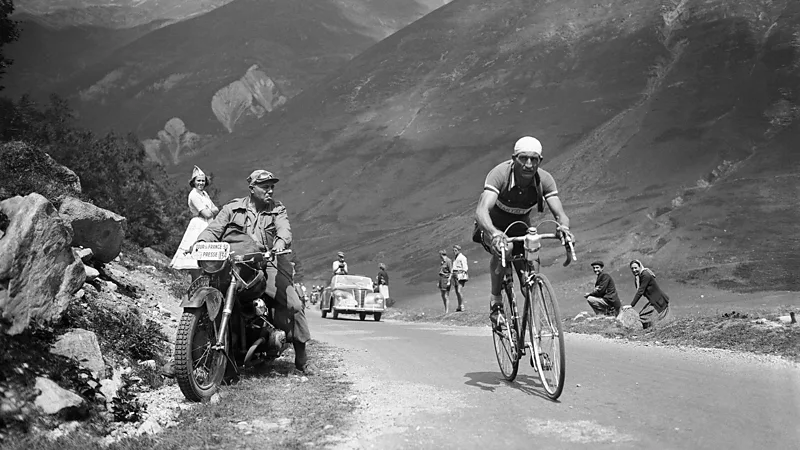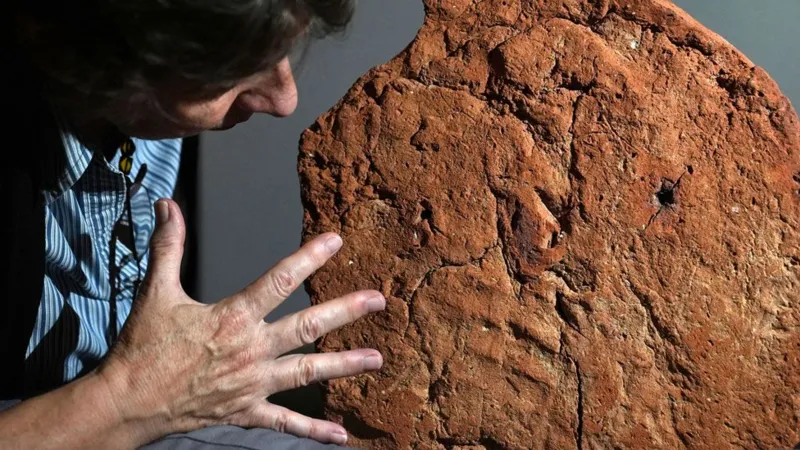The Tour de France champion who saved hundreds of Jews
With this year's Tour de France starting in Florence, it's the perfect opportunity to celebrate the city's cycling hero: two-time Tour de France winner, Gino Bartali.

Piazzale Michelangelo, nicknamed "the balcony of Florence" for its expansive views over the Tuscan capital from its vantage point just over the Arno river, will take centre stage at the Tour de France’s Grand Depart on 29 June. This is where teams of elite cyclists will be presented to masses of fans before the official race departure from Piazza della Signoria in the historic city centre.
This is the Tour’s first departure from Italy, and locals simply cannot wait. For bicycle-mad Italy, having just hosted the Giro d’Italia, this is truly an occasion to be proud of.
"I am incredibly excited about the Grand Departure in Florence and believe that the Tour de France could only start from here and from the beauty of Tuscany, a true land of cycling," said Silvia Livoni, cycle tourism consultant for Tuscany’s tourism agency, Toscana Promozione Turistica.
And for Florence, it's the perfect opportunity to celebrate their own cycling hero, three-time Giro d’Italia and two-time Tour de France winner, Gino Bartali, who is also being officially honoured as part of the Tour's promotion.
Born in 1914 in Ponte a Ema, a small town near Florence, Bartali grew up to become one of the greatest cyclists in history. As a child, Bartali cycled up to Piazzale Michelangelo with his brother Giulio to admire the beautiful domes of Florence, dreaming of one day being a great racer. Unknown to the small boy at the time, he would be remembered not only as one of the best, but also as something a lot more.
When he passed in 2000, the Guardian described him as the "icon of Italian cycle racing" and focused their obituary on his cycling prowess and achievements.
What the obituary did not mention, nor did any other media at the time, however, was the secret life Bartali lived during World War Two, when he risked his own safety to save the lives of persecuted Jews and dissident refugees.
Between 1943 and 1945, as part of a religious underground network, Bartali cycled thousands of kilometres couriering fake identity documents covertly printed by an underground movement led by his friend Archbishop of Florence Cardinal Dalla Costa. They were being delivered to Jewish and other political refugees to help them escape Nazi-controlled northern Italy. Donning his race jersey with his name printed across the back and leaving home with only emergency tools for the bike, he rode thousands of miles from Florence to Genoa and Assisi carrying this precious cargo.
Based on this act alone, he is credited for saving the lives of more than 500 people.
For Bartali, his status as a champion cyclist was the ultimate disguise. Whenever he was stopped enroute, he would simply say "I am training", and no one questioned him further.
Bartali was fighting the regime that had initially used his cycling for politics. His win at the Tour de France in 1938 was used as propaganda by Italy’s fascist regime to "prove" the might of the Italian race, and his bicycle became his defiant weapon against a government he did not support – especially when Italy introduced a racial policy that year to exclude Jews from schooling and employment. When Italian dictator Benito Mussolini praised him for winning the race, Bartali chose not to respond, dedicating his win to the Catholic church instead.
When World War Two broke out, Italy’s fascist regime allied with Nazi Germany and began to implement the arrest of Jews in Italy. The partisan rebels were particularly strong in Tuscany because the region was on the edge of where Allies were advancing from the south and the Germans from the north. Like many Tuscans who opposed the racial ideal policy, Bartali was given the opportunity to help.
Cycling in Tuscany
Tuscany is a great region for cycling, whether following the challenges of the Tour de France route or for a simple pleasure ride around the gorgeous countryside. Try these four trail ideas to get a glimpse into Bartali's world:
1. Florence to Ponte a Ema: It's a short 8km ride along the river and through country roads to Bartali’s hometown, where you can visit the museum and enjoy the quieter side of Florence along the way.
2. Challenge Tour de France: Follow this year’s Tour and take the challenging first climb to Valico Tre Faggi on the border of Emilia-Romagna. Start from Dicomano by car or train to avoid the traffic coming out of Florence.
3. Ciclopista del Trammino: The Trammino cycle path begins at Pisa and follows an old railway line all the way to the sea. An easy and enjoyable day trip suitable for all cycling abilities.
4. Volcanic mountain biking: One of Tuscany's dormant volcanoes, Monte Amiata, has a fantastic network of mountain bike trails, including the opportunity to relax at a natural hot spring at the end of the day.
Travellers can see proof of this at Terontola Train station, about 110km south of Florence, where there's a plaque dedicated to Bartali. Other than being a courier, Bartali's champion status allowed him to work with partisans to create a paparazzi scenario that distracted soldiers and guards away from the train carriages so refugees could board and hide until the train reached the free south.
Yet, he kept this life a secret for most of his life after the war. Bartali believed that by talking up his good deeds, he betrayed the people he had helped as it became an act of self-promotion rather than genuine intentions.
"He never told anyone besides me, making me swear not to tell anyone," Gino’s son, Andrea, recalled in the 2014 film My Italian Secret, a documentary about the brave acts of unsung heroes during the war. Andrea was already in his 30s and, other than those directly affected, was the first person Bartali told of what exactly happened during the war.
After Bartali’s death in 2000, his story came out piece by piece through his son, his friends and those whom he had helped, including Giorgio Goldenberg who, as a boy along with his family, Bartali had hidden in his basement to escape capture. Since then, books and films have been made to tell Bartali’s story, as well as a West End musical that ran for a season in London in 2023.
Gino did not see himself as a hero, Andrea says in the film, recalling his father's words: "I want to be remembered for my sporting achievements. Real heroes are others, those who have suffered in their soul, in their heart, in their spirit, in their mind, for their loved ones. Those are the real heroes. I'm just a cyclist."
Maurizio Bresci, president of the Gino Bartali Cycling Museum, recalls his father, Andrea Bresci, who was a friend of Bartali, first mentioning the idea of opening a museum in Bartali's honour in 1986. "At first, Gino didn’t agree with the idea," Maurizio told me. The idea was well received at the time by Bartali's friends and family, the media and the public, but it still took a while to convince the great cyclist. "Gino finally said ‘OK, but it must be a cycling museum for all the cyclists, not only for me’."
The museum opened in 2006 in Ponte a Ema with exhibits including newspaper clippings, athlete cards, personal documents, bicycles, photographs and the 1948 Tour de France trophy, which Bartali himself donated to the museum. When Andrea passed away in 2020, Maurizio took over the museum’s presidency and continued his father’s work of preserving Bartali's story. With limited workforce and funds, the museum is still a work in progress. "This is my life, my passion," Maurizio said, "to keep Gino’s story alive."
Getty Images Gino Bartali’s Legnano racing bike was put up for auction in 2021 in Turin (Credit: Getty Images)Getty Images
Gino Bartali’s Legnano racing bike was put up for auction in 2021 in Turin (Credit: Getty Images)
Bartali's story will get a moment in the international spotlight when the grand prix of cycling races through Ponte a Ema on 29 June. For the Tour de France, Bartali is the iron cyclist who won the race twice, once before and once after World War Two, both at the height of political unrest. The gap of 10 years between his victories is a record that no one else has achieved.
I believe that the Grand Depart from Florence is significant not only for Florentines but for all Tuscans and Italians and for the whole world - Silvia Livioni
It should be an exciting time for the museum, however for political reasons, the Tour is not promoting Bartali's life-saving work, focusing only on his cycling achievements. However, it is clear that Tuscany is hugely proud of the champion, and locals hope that tourists will pause to learn how Bartali's selfless actions changed the lives of so many.
"I believe that the Grand Depart from Florence is significant not only for Florentines but for all Tuscans and Italians and for the whole world," said Livoni, "And it is rightful to dedicate this to Bartali, to tell his story today in order to make people understand his human depth. I hope his story inspires people to stand up for what they believe in, even when it's difficult."
-bbc







